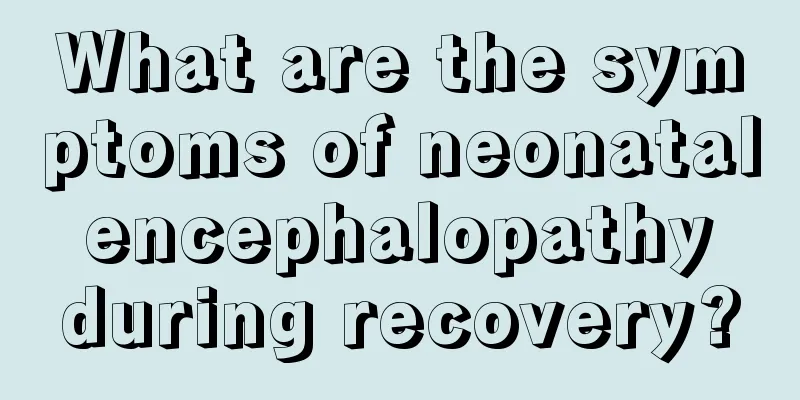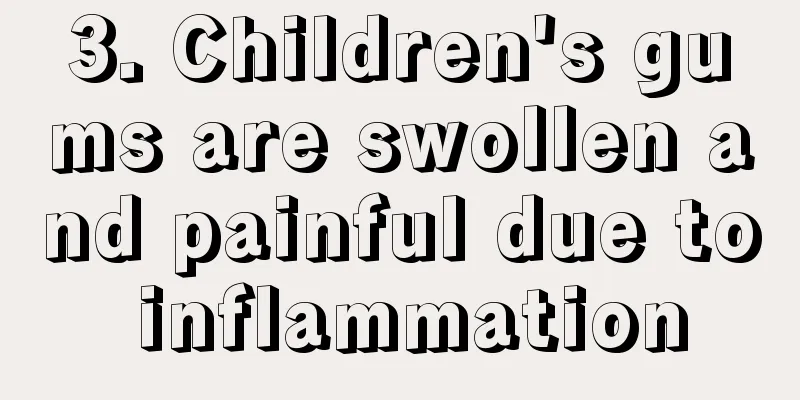What are the symptoms of neonatal encephalopathy during recovery?

|
Generally speaking, the symptoms of neonatal encephalopathy recovery period are different for every baby. Some babies may show more obvious symptoms, while others may not be particularly obvious. In fact, as long as the medication is used safely under the guidance of a doctor, and the baby's physical development and various indicators are normal, parents do not have to worry. When taking care of the baby, we must pay more attention to observing the baby, and seek medical attention in time if any abnormality is found. Neonatal hypoxic-ischemic encephalopathy refers to a series of clinical encephalopathy manifestations caused by hypoxic-ischemic damage to the baby's brain due to perinatal asphyxia. This disease not only seriously threatens the life of newborn babies, but is also one of the most common causes of disability and illness after the neonatal period. There is no specific treatment for this disease. Efforts should be made to prevent fetal distress and improve the level of resuscitation of neonatal asphyxia. During the delivery process, the fetal heart rate should be closely monitored, intrauterine distress should be detected early, and the best method should be selected to end the delivery as quickly as possible. For newborns who suffer asphyxia after birth, effective breathing and complete circulatory functions should be established as quickly as possible to minimize the damage to brain cells caused by postnatal hypoxia. After resuscitation from asphyxia, the neurological symptoms of newborns should be closely observed and all vital signs monitored. Once abnormal neurological symptoms such as impaired consciousness, decreased limb tension, and difficulty in eliciting primitive reflexes are found, the diagnosis of this disease should be considered and treatment should be given early to reduce the incidence of sequelae among survivors. Neonatal hypoxic-ischemic encephalopathy can easily cause brain damage in newborns and is a dangerous disease that can be fatal. Neonatal hypoxic-ischemic encephalopathy is often caused by perinatal asphyxia. Perinatal asphyxia is the main cause of neonatal hypoxic-ischemic encephalopathy. Anything that obstructs blood circulation and gas exchange between the mother and fetus, resulting in a decrease in blood oxygen concentration, can cause suffocation. 50% are caused by intrauterine asphyxia, 40% by asphyxia during delivery, and 10% by congenital diseases. There are many factors that cause neonatal hypoxic-ischemic brain damage: 1. Hypoxia (1) Perinatal asphyxia: including antenatal, intrapartum and postpartum asphyxia, intrauterine hypoxia, placental dysfunction, umbilical cord prolapse, compression and cord winding around the neck; abnormal delivery such as precipitous labor, delayed labor and abnormal fetal position; abnormal fetal development such as premature birth, post-term birth and intrauterine growth retardation. (2) Apnea: Repeated apnea can lead to hypoxic-ischemic brain damage. (3) Severe lung infection: Newborns with severe respiratory diseases such as severe lung infection can also cause this disease. 2. Ischemia (1) Severe circulatory system diseases: cardiac arrest and bradycardia, severe congenital heart disease, severe heart failure, etc. (2) Massive blood loss: massive blood loss or shock. (3) Severe intracranial diseases: such as intracranial hemorrhage or cerebral edema. Among the causes of neonatal hypoxic-ischemic encephalopathy, neonatal asphyxia is the main cause of the disease, with antenatal and intrapartum asphyxia accounting for 50% and 40% respectively, and other causes accounting for about 10%. Pregnant women should have regular prenatal checkups during pregnancy and actively communicate with medical staff before delivery to minimize the risk of perinatal asphyxia leading to hypoxic-ischemic encephalopathy in the newborn. |
<<: How much weight can a newborn baby gain in two months?
>>: How to promote bowel movements in newborns?
Recommend
What to do if there are small white spots on your baby's face
The baby's skin is particularly delicate and ...
Can children eat Polygonum multiflorum?
In daily life, we can always see various Chinese ...
How often should newborns take calcium supplements?
Calcium supplementation is very helpful for the b...
Is it okay for children to always sleep on their stomachs?
After birth, the baby will always stick to the pa...
Symptoms of bronchitis in children
Childhood bronchitis is one of many common childh...
Can children grow taller by taking calcium tablets?
Height development has become a big problem nowad...
The child is too timid to speak
The chance of a child being born timid is very sm...
Why does the baby have a fever and cold hands and feet?
When a baby is sick and has a fever, it makes eve...
What should I do if my child has a sore throat? What are the simplest methods?
When a child has a sore throat, as a parent, of c...
What to do if your 11-month-old baby can't crawl
Baby crawling is actually a very important thing ...
What to do if your baby is anemic for one week
Anemia in babies is a common disease. There are r...
What should I use on my baby's prickly heat?
In the hot summer, babies sweat a lot due to exer...
How tall is a 16 month old baby?
After a child is born, many issues concern adults...
The benefits of babies sleeping on their stomachs
Nowadays, many children not only like to sleep on...
Can I bathe my baby when he has a fever? Parenting experts tell you
Many parents think that they can give their baby ...









